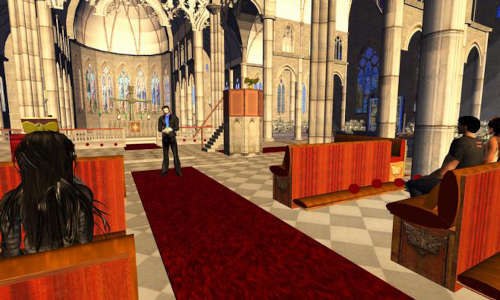
Theological and pastoral questions about the virtual world are not going away. Avatars acting for individuals in a virtual, digital world have again been much in the news with Facebook changing its company name to Meta last year. This company has been building a metaverse in which digital avatars act as stand-ins for our physical bodies – for meetings and other encounters.
This is not new. In 2007, people began building an Anglican Cathedral in Second Life. Second Life is an online world – you go there as an avatar and participate in whatever you like that is available. In 2008, Second Life was a “fringe event” at the Lambeth Conference.
In 2008, I wrote:
It seems to me inevitable that the virtual world will develop, and short-sighted for the church to be reluctant to have mission and ministry in this new land. There are many issues that need positive, imaginative reflection. Struggles over episcopal oversight in First Life may soon appear very antiquated and meaningless if more and more of our lives are spent in some form of Second Life.
The printing press revolutionised our world, our church, our liturgy. Web 2.0 is inevitably transforming world, church, and liturgy. Some are suggesting the next Lambeth Conference, if there is one, ought to be held in another place – in the Southern Hemisphere, for example. Am I the first to suggest that a forthcoming Lambeth Conference be held in Second Life?
Those words appear eerily prophetic now. Covid forced churches to scramble online. Having often claimed that digital mission and ministry was an eccentric and obscure fringe activity, and too difficult for ordinary clergy and congregants, Christians suddenly found it to be central and simple.
The theological questions of sacraments in some form of metaverse/Second Life are not going to go away. I am at the end of the spectrum that continues to hold that, say, baptising your avatar in a virtual world does not effect your baptism In Real Life (IRL). Doing it via zoom whilst the “recipient” puts water on him/herself, similarly, does not effect baptism. I think discussions about incarnation and docetism in the Early Church can be drawn into the reflections.
We have had about a decade and a half, since my quote above, when we could have been discussing this formally – there has been the occasional paper and a few snarky social media responses to my presenting a position, but there have been, to my knowledge, few formal church pronouncements at General Synod level or its equivalent.
As we are now well into the revolution that Covid is bringing to our world, churches have had periods of being completely closed and everything being online. Now, many are tinkering with hybrid services: live streaming services with congregants present.
My guestimate is that we might have a third fewer congregants physically present. People have lost the habit of church; people find virtual church easier (some church leaders are debating whether we should stop streaming services – but that horse is long bolted now); services with masks on; demands for vaccine passes; fear of catching Covid – these are all part of reducing church attendance numbers.
When the number of teenagers and people in their early twenties thinned in congregations, people consoled themselves with, “they will come back to marry; they will come back when they have children…” When older women disproportionately made up congregations, I heard people console themselves with, “when these babushkas move on, new babushkas will come to take their place.”
Church statistics are poorly kept or twisted to make us feel better. Some people are counting the few minutes that someone pops in to view a service online as part of their congregational numbers (so one person in London can now count for 10 people on a Sunday morning as they pop in to several services around the world during an hour on Sunday).
Liturgy online is even more about viewing and less about participating (liturgy = work of and for the people). Protestants, where churchgoing struggles to sound little like “works”, often have a me-focused “going to church builds up my faith” (and usually by the preaching). If I find a YouTube channel where the preaching is better than I get at my local, am I not thereby required to stay home and watch the YouTube sermon (conveniently at 1½ speed)? And, it is presumably worse for the once-saved-always-saved approach.
We can tinker with our statistics to our hearts content to make us feel better, but I suspect we are in a perfect storm reducing church and its impact: postmodernism, materialism, Covid, losing the church-going habit, church sex scandals,… and we are still using second-millennium thinking in our third-millennium, digital context.
To be continued with a reflection on pastoral care in the metaverse…
Meanwhile, there’s plenty on this site reflecting on sacraments in the metaverse; use the search in the header for virtual sacraments. And you can also start here, then here, and here.



Great stuff, Bosco, loved reading it as one of the converts to interactive online zoom church (as opposed to live-streamed worship which leaves me cold…). There’s been a fair amount of positive theological reflecting on digital pastoral care as well as sacraments over here in the UK – its certainly changing the way I teach – hopefully for the better!
Thanks, Jacky! If you can point us to some of the UK digital pastoral & sacramental reflecting that would be great! Blessings.